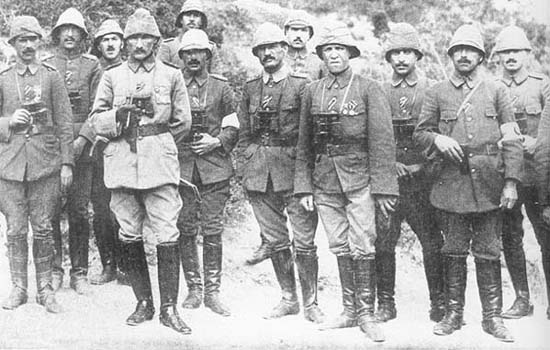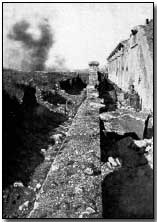Chapter 2 : Das Unsterblich
We are not making a sacrifice
Jesus you have seen this war
We are the sacrifice
Sons of Ulster
I was born in the winter of 1896. Underweight and suffering from underdeveloped respiratory organs, the doctors didn't give me much of a chance. Apparently I proved them wrong.
My father General Frederick Von Brandt, then 49, christened me, his first and only son after 3 daughters, with the name of Martin. He was a man of iron and steel, the standard-bearer of a glorious family history, now ready to hand the standard to his son.
My family tree goes way back in the history. Brandt family is one of the families that stood besides Luther and dictated the Augsburg treaty after his death. Since the late 16th century we were involved in each and every major fight, and bled for Germany. My Grandfather Count Karl Von Brandt fought against Napoleon I, and my father fought against another Napoleon: the third one, under Bismarck. I would wage war against France in another period in history, and so would my sons.
Because of the family name as well as his heroics, my father was well known and respected among higher circles. I clearly remember Hindenburg's visits to my father more than once. Their friendship went back to the battle of Koniggratz in 1866, where they fought together. Herr Hindenburg always treated my father with utmost respect and me like a son.
I followed my father's footsteps and attended the cadet school at Berlin. I was a very good student, if not the best. Yet, I have also been told to learn to control my vicious anger, which transformed into a brutal explosion at times.
I was 17 in Spring 1913
When the Great War broke in 1914, I was serving with 1st corps of the 8th Army, as the personal post of General Francois. I have witnessed the Battles of Stalluponen and Gumbinnen, though I was not given the chance to take an active duty.
After the Battle of Gumbinnen, Hindenburg replaced the ill-fated Prittwitz, and I was transferred to General Hindenburg's headquarters on August 19th 1914, a day before the famous Battle of Tannenberg. To my frustration I was not allowed to take an active duty and dully remained in the headquarters during the rest of the 1914. Yet this monotonous period helped me to observe the high rank relationships, the art of operative thinking, and the essentials of being a great commander.
In January 1915 I requested my transfer, because I wanted to command my own unit. However high-ranking officers, not unlike the ancient Greek gods were determined to isolate me from any possible danger, so they sent me to serve under Liman Von Sanders in Dardanelles, where at that time seemed to be the most secluded place on earth.
As a first lieutenant, I started working under Von Sanders preparing the Turkish defenses for an imminent attack on the peninsula. There I met with a brilliant young colonel named Mustafa Kemal, who later would be one of the most prominent figures of the modern history.
When all hell broke loose on April 25th, I have requested to move to the front line time and time again, without any success… Until August, where Sanders, almost overwhelmed by the gravity of the situation accepted my request and transferred me to the Anafarta sector to serve under Colonel Mustafa Kemal.
While the colonel hardly spoke any German and I any French, we communicated rather well to our astonishment. He was a true front line commander as well as an operative genius. I observed that motivation is an essential quality of a front line commander, when he succeeded in organizing a routing battalion to stop the oncoming allied offensive in a matter of minutes.
Mustafa Kemal (4th from the left) was a great front line commander as well as an operative genius - Picture taken on August 9th 1915 by Martin Brandt - From Martin Brandt's personal collection
On August 11th, shrapnel exploded very close to us. A piece hit Kemal but was stopped by his pocket watch. I wasn't that lucky, a piece ripped my guts open, and I was immediately taken to a field hospital, where everything including water lacked. A Turkish doctor said my wound was fatal and they left me to die in an isolated corner of the hospital tent stained all over by blood. Yet I didn't. The next day, Colonel Kemal visited me and arranged my transfer to a hospital in Istanbul.
It took a long time for me to recover and I barely made it to Germany before Christmas 1915. Now promoted to Captain, I enjoyed my last Christmas dinner with my whole family. My father Frederick Brandt passed away in February 1916. A state funeral was held in which the Kaiser himself personally attended and awarded me with an undeserved Pour Le Merite. Normally I should have been given an iron cross, but since Kaiser were to award me the medal, an iron cross would have been improper, so they changed it to a "Blue Max". It was presented almost as a remedy for my father's untimely death. I never wore it until 1936.
I transferred to Verdun on February 20, 1916 to 24th Brandenburg Infantry Regiment. The next day the infamous Battles started. On 25th we took Douaumont. On June 7th I was credited for taking Fort Vaux, after a bloody battle in which I was wounded for three times, but didn't delegate the command. I was hit on my right calf in the morning, and on my stomach and neck consecutively in the following hours. When Major Raynal finally capitulated I was bleeding white.
Fort Vaux
Because of my heroics, and an apparent tendency to beat death time and time again, out of respect my men started calling me "Das Unsterblich" -The Immortal. I learned my nickname, which would stick with me for the rest of my life while in Berlin for rehabilitation.




